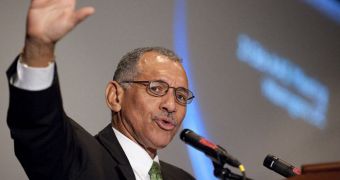In a speech he held Tuesday in Washington DC, at the 215th meeting of the American Astronomical Society (AAS), NASA Administrator Charles Bolden urged nations to work more closely together in the field of space explorations. He also emphasized the fact that the United States must also engage in more cooperative efforts with foreign countries, in a bid to cut down the huge costs usually associated with exploring the solar system. Bolden also said that he found unacceptable the fact that the US came up with space plans on their own, and only then invited other states to participate, in a take-it-or-leave-it kind of deal, Space reports.
“We have got to make them true partners, which means they sit at the table when you plan. We have incredibly talented partners and we have to learn to trust them,” Bolden said at the largest astronomical conference ever to take place in history. The NASA Chief also underlined that such a cooperation would also improve America's image in the eyes of the world. According to the official, most other countries only associated US citizens with images of their soldiers waging wars in many countries. Bolden believes that true cooperation may help show the world that America is not all about armed conflicts.
In addition, better, more complex, and cheaper missions will become a reality. For example, experts say, the recent agreement between NASA and ESA regarding Martian exploration saw the program extended considerably. As the two space agencies pool their resources, expertise and engineers together, the pace of innovation is quickened, and the financial burden is split between the United States and all of the 27 European Union member states. This not only helps exploration programs endure, but also reduces costs to the point where the space money can be used to create new programs.
Speaking about the challenges ahead of NASA, Bolden said, “I don't know what the president's decision is going to be. I do not see this present being the president who presided over the end of human space exploration. I can make this commitment to you: The future of human spaceflight will not be paid for out of the hide of the science budget.” The official also revealed the importance of educating future generations in scientific areas of expertise. He also said that astronomers needed to communicate with the general public more, so as to boost public support and involvement in space exploration.
“I need for you to get out and do things you're not accustomed to doing. We are going nowhere, nowhere, if we don't educate our kids,” he concluded.

 14 DAY TRIAL //
14 DAY TRIAL //